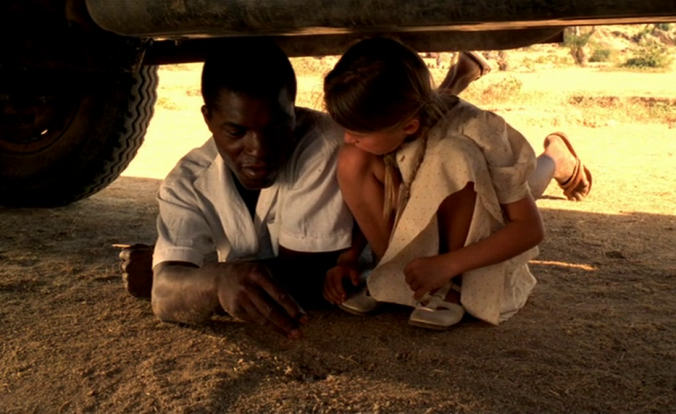
Claire Denis’ has given us some of the best films about French colonialism in Africa. Chocolat (1988), her directorial debut, inaugurates her career long investigation into what imperialism meant and continues to mean today. I’ve read that many aspects of Chocolat are semi-autobiographical, which isn’t all that surprising. Chocolat and White Material (2009) both feature children prominently in one form or another, priviledging their view on events. These characters, particularly France in Chocolat, serve as proxies, not just for Denis herself, but for the audience.
Chocolat is set in Cameroon in the late fifties and focuses on France (Cécile Ducasse), the daughter of a French administrator, and her relationship with Protée (Isaach De Bankolé). There is a symmetry between these two characters in how authority (France’s parents) interact with them. France is, of course, treated as a child; her parents often assuming that she is too young to understand what she sees going on around her. Protée, on the other hand, is a Cameroonian “house boy”; treated as a servant, a pack animal, and a sexual object, all in turns. In this way both exist outside of the power nexus of France’s parents with whom their fates reside.
Though Denis draws parallels between systemic racism and chauvinism, she never proposes that they are the same. To Denis they are separate forms of oppression working within the larger social complex. In some respects Denis points to how each group can oppress the other, particularly with regards to Protée’s sexualization by France’s mother (Giulia Boschi).
Chocolat isn’t a film about the story, it’s about characters and location. Denis is far more interested in mood and atmosphere than she is in narrative economy. It’s also interesting to note that the bulk of the film is a flashback that the adult France experiences while drifting in and out of sleep in the back of a car driving through the Cameroon countryside. Similar to the films of Wim Wenders, Denis suggests that the act of memory is one of motion; France physically moves forward while her consciousness moves backward in time. The symbolism of roads and journeys in both Wenders’ and Denis’ works suggests a common interest in the metaphor for cinema that transportation provides. More than that thought is the idea central to Denis’ cinema where the auteur is both physically and philosophically itinerant.
